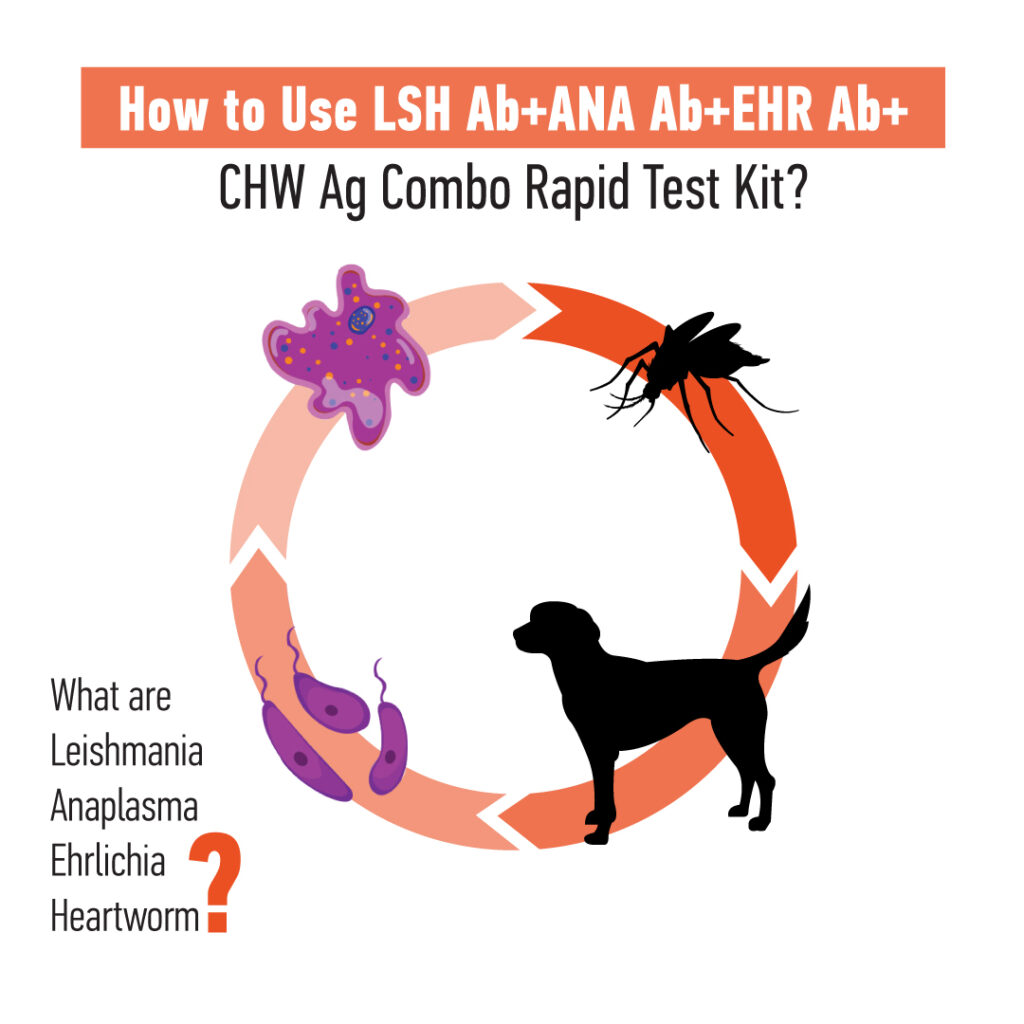Although regular health checks and immunizations offer significant levels of protection, our pets remain susceptible to a wide array of infectious diseases caused by various pathogens, such as bacteria, viruses, and parasites. Leishmaniasis, anaplasmosis, ehrlichiosis, and canine heartworm are among the most common and consequential infections affecting canine health. As the symptoms of these infections may mimic those common to many other infections and conditions, testing offers significant benefits for their diagnosis. Rapid chromatographic immunoassays, such as our LSH Ab + ANA Ab + EHR Ab + CHW Ag Rapid Combo Test Kit, are quick, convenient, and highly accurate options for the detection of these infections. Read along to learn more about these infections and how they are detected with the Leishmania + Anaplasma + Ehrlichia + Heartworm Combo Rapid Test Kit.
What is Leishmania (LSH)?
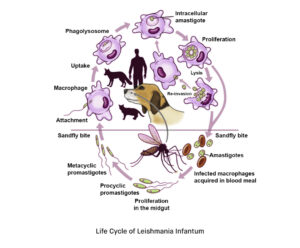
Canine leishmaniasis is a life-threatening multisystemic disease caused by the widespread protozoan parasite Leishmania infantum. It primarily transmits through the bites of infected sandflies. Upon infection, the host’s immune system can react and prevent the development of symptoms for as long as years. Once apparent, the symptoms of leishmaniasis may include skin lesions, weight loss, lethargy, ocular abnormalities, epistaxis, vomiting, melena, vomiting, nosebleeds, diarrhea, or colitis. These symptoms may last anywhere from a few months to several years. Canine leishmaniasis has an endemic presence in approximately 90 countries across Europe, Africa, Asia, and South and Central America. Since current treatments have proven unlikely to prevent the recrudesce of the disease, leishmania constitutes a major veterinary and public health issue. Infection prevention through vaccination and insecticides is currently the most effective strategy against the disease.
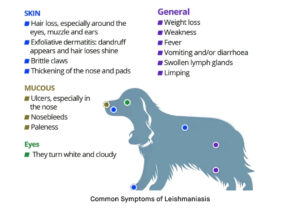
What is Anaplasma (ANA)?
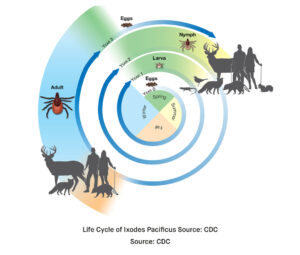
Anaplasmosis is a tickborne infection caused by the bacteria Anaplasma phagocytophilum and Anaplasma platys. Neutrophilic canine anaplasmosis, the most common form of anaplasma, is an acute febrile disease primarily spread by the bite of black-legged ticks. Thrombocytotropic anaplasmosis, on the other hand, is caused by Anaplasma platys and is more commonly spread by brown dog ticks. Since these two types target different cells within the host, the signs and symptoms of anaplasmosis depend on the bacteria responsible for the infection.
A significant portion of the dogs with anaplasmosis shows no symptoms. In symptomatic cases, however, neutrophilic canine anaplasmosis often presents with flu-like symptoms that may range from moderate to severe. Symptoms to watch for include lethargy, fever, decreased appetite, dehydration, lameness, fever, chills, joint pain, coughing, vomiting, diarrhea, labored breathing, seizures, meningitis, and ataxia. In addition, as the infection targets the platelets and alters the host’s ability to form blood clots, thrombocytotropic anaplasmosis may present with symptoms such as nosebleeds, bleeding gums, and bruises.
Anaplasmosis can effectively be treated with the antibiotic doxycycline. However, efficient tick control is the best way to protect your pets against anaplasmosis. In addition, since the clinical presentation of anaplasmosis is often vague and non-specific, testing also remains critical for its differentiation from other infections and conditions with similar signs and symptoms. For instance, anaplasmosis is often confused with Lyme disease due to its common vectors and clinical presentations.
What is Ehrlichia (EHR)?
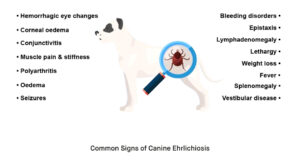
Ehrlichiosis is a tickborne infection caused by the bacteria of the genus Rickettsiae. Among these, the most common species affecting dogs is Ehrlichia canis (E. canis). Ehrlichia canis (E.canis) primarily transmits through the bites of infected brown dog ticks. Ehrlichiosis often develops in stages. The acute phase of the infection may present with symptoms such as fever, swollen lymph nodes, weight loss, bleeding disorders, and neurological problems. The acute phase may last two to four weeks. If the dog does not eliminate the infection at this stage, the infection proceeds into the sub-clinical phase. The sub-clinical phase of infection does not present with any outward symptoms. Thus, infections at this stage may go unnoticed by owners. However, suppose the immune system of the infected dog fails to eliminate the bacteria. In that case, the infection may develop into clinical ehrlichiosis and present with a wide array of symptoms such as anemia, bleeding episodes, lameness, ocular problems, neurological problems, and swollen limbs. At this point, the infection may result in the failure of the bone marrow and lead to the death of the infected animal.
What is Canine Heartworm (CHW)?
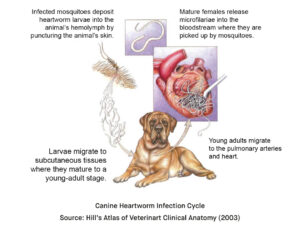
Canine heartworm is a serious disease caused by the blood-borne parasite Dirofilaria immitis. When a mosquito bites an infected dog, cat, or wild animal, it picks up microfilariae. These organisms mature into the infective stage in 10 to 14 days. If the infected mosquito bites another animal that is susceptible to the infection, the infective larvae are released into the bloodstream. Traveling to the heart, pulmonary artery, and adjacent blood vessels through the bloodstream, the parasites mature into adults, mate, and reproduce microfilariae within a period of 6 to 7 months.
The infection may cause no observable symptoms throughout the early stages. However, as the infection progresses, the infected animal may present with a mild persistent cough, reluctance to exercise, fatigue following moderate activity, loss of appetite, and weight loss. Without medical intervention, the infected animal can present with a swollen belly due to excess fluid in the abdomen. At this stage, the infection can also cause heart failure or caval syndrome, which is characterized by sudden blockages of blood flow within the heart. Common symptoms of caval syndrome develop suddenly, including labored breathing, pale gums, and dark, bloody, or coffee-colored urine.
How to use the LSH Ab + ANA Ab + EHR Ab + CHW Ag Combo Rapid Test Kit?
The LSH Ab+ ANA Ab + EHR Ab + CHW Ag Combo Rapid Test Kit is a rapid chromatic immunoassay for the in vitro qualitative detection of antibodies against Leishmania infantum, Anaplasma spp., and Ehrlichia canis, along with canine heartworm (CHW) antigens in canine whole blood, serum, or plasma samples. Coming in a lateral flow assay format, the kit incorporates multiple sets of antigens and antibodies that interact with the antigens and antibodies that may be present in the tested sample. As the liquid migrates along the surface of the assay through capillary flow, these particles bind to and capture Leishmania infantum antibodies, Anaplasma spp. antibodies, Ehrlichia canis antibodies, and canine heartworm antigens, resulting in the appearance of colored lines at the end of the assay.
Following the collection of the serum, plasma, or whole blood sample as instructed, a sufficient amount of the sample is transferred from the tube to buffer solutions included in the kit. After the collected sample is mixed with the solutions, a few drops of the liquid are added to the wells for each pathogen to be tested. If the tested sample is positive for a given pathogen, the test line (T) and the control line (C) appears within the reaction time specified in the manual. If the test is negative, only the control line (C) is present at the end of the specified period. Regardless of the presence of the test line (T), the absence of the control line (C) indicates an invalid result. In that case, the procedure must be repeated with a new kit.
